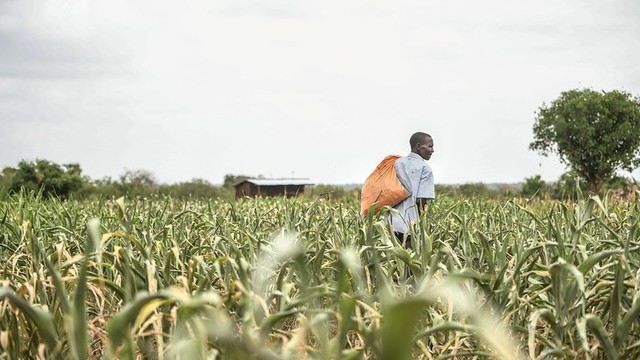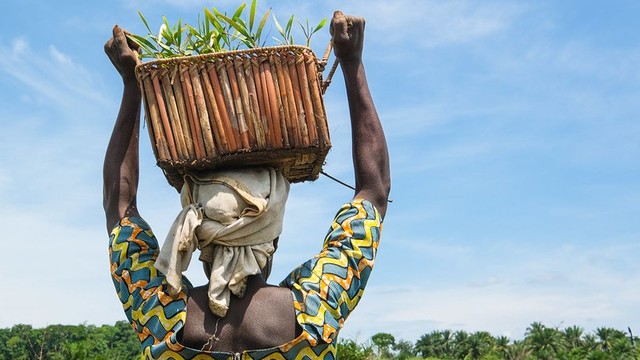Why coastal communities are crucial to success at COP15
Resilient and innovative, coastal communities in Mexico make huge contributions to the region’s marine biodiversity conservation. Guest bloggers María José Espinosa and Valeria Ontiveros set out why these communities are essential to achieving the 30x30 target and the success of the post-2020 global biodiversity framework.



Cutting shells during the pandemic. This photo won a 2021 competition to reflect life in fishing communities in the face of COVID-19 in Latin America and the Caribbean organised by Comunidad y Biodiversidad A.C. (COBI) and the Red de Jóvenes Líderes en Áreas Protegidas y Conservadas de Latinoamérica y el Caribe (ReLLAC-J) (Photo: copyright Guillermo Soberón)
The 30x30 target – a global goal to protect 30% of land and sea by 2030 – features in the draft post-2020 global biodiversity framework (GBF); the framework itself is set to be agreed at the UN biodiversity negotiations (CBD COP15) in December.
This will mark a key moment for countries to reunite and draw clear lines of action toward biodiversity conservation for a healthy future.
Currently, less than 9% of the ocean is covered by Marine Protected Areas (MPAs) or other effective area-based conservation measures (OECMs), such as areas conserved by Indigenous Peoples and Local Communities and areas under small-scale fisheries management. Furthermore, many of these areas are ineffective and fail to uphold the rights and interests of local people.
In Latin America and the Caribbean, for example, marine coverage of protected and conserved areas has reached nearly 25%. However, less than 2% of these areas have management plans, giving little reassurance that they are effective in their protection, and limited attention has been paid to good governance and equity.
Whether through MPAs or OECMs, both of which are important tools, coastal communities are essential to achieving the 30x30 target and to the success of the GBF.
Since its foundation in 1999, Comunidad y Biodiversidad (COBI) has raised awareness about how coastal communities in Mexico have proactively, consistently and significantly contributed to marine biodiversity conservation.
Through our work with 34 communities in and around 51 marine reserves we have seen how these communities contribute to and improve marine reserve design and management, by providing local knowledge that is crucial in sites where information is poor, and by monitoring and protecting over 510km2 of coastline that hold 192 species of fish and invertebrates on IUCN’s red list of threatened species.
When COVID-19 hit
The global restrictions put in place during COVID-19 had devastating impacts on coastal fishing communities. COVID-19 also presented a threat to human rights by increasing the vulnerability of marginalised groups including women, youth and Indigenous People.
When Mexico went into lockdown, COBI set out to understand how coastal communities were dealing with the upheaval of the pandemic. How were their fishing activities and food security disrupted? How were they adapting? And could we find ways to support sharing of local solutions and best practices?
Data gathering
Between April and December 2020, we carried out 1,493 interviews with 397 fishers affiliated with more than 150 fishing organisations, across the 17 coastal provinces and Mexico City. We disseminated the results regularly through a WhatsApp group to 400 members, including fishing cooperatives and communities throughout the country.
Through the interviews we heard about the ongoing social, economic and environmental impacts of the pandemic – including closure of certain seafood markets, the value of catches declining, and increased volume and insufficient management of solid waste.
Agile and resilient
In the face of these challenges, the response from coastal communities demonstrated their resilience and capacity to adapt to change by developing locally-led solutions, including maintaining biodiversity conservation and management of sustainable fisheries.
For example, they shared how they were finding new and digital ways of marketing their products mainly on Facebook, finding alternative markets for low-value products such as finfish, and food exchanges within their communities, as well as continuing to respect marine reserve regulations, participating in enforcement activities and monitoring species and ecosystems.
A digital platform – by fishers, for fishers
Hearing these experiences prompted us to develop a digital platform to connect actors in coastal communities, including women, youth and fisheries organisations, and support their collective action towards sustainability, resilience, and biodiversity conservation.
The PescaData mobile app (link in Spanish) provides a tool for fishers and fish workers to keep track of their daily catches and expenses, and to market their catch. Through the platform, coastal people can share local solutions to challenges. These range from the monitoring of no-take areas, to the formation of fishing cooperatives by women seeking to improve the quality of life, as well as the creation of savings funds by fishing cooperatives to be used in times of emergency.

Example images from the PescaData app (Images: Comunidad y Biodiversidad A.C. (COBI))
To support incubation and accelerate replication of these local solutions, COBI has expanded the network of users from Mexico to eight other countries in Latin America and the Caribbean. After two years of work, we are proud to have 1,877 users in PescaData, with access to 47 solutions.
Our next step is to support the collective impact of these solutions and their contribution to global agendas by helping to attract capital for these solutions.
Talking local solutions global
Already, many of the solutions shared across the app demonstrate the tremendous value of integrating local people and their initiatives into efforts to reach the 30x30 target, both in terms of expanding coverage of marine protection and supporting more effective and equitable governance and management.
COP15, now just around the corner, provides an opportunity for countries to acknowledge the range and depth of locally-led solutions to the biodiversity crisis, and the importance of ensuring that the rights, needs, interests, cultural values and knowledge of local people are central to biodiversity conservation going forward.
COP15 is also an opportunity to build on momentum generated by the UN designating 2022 as the International Year of Artisanal Fisheries and Aquaculture (IYAFA), during which small-scale fishers have made a call to action for governments to, among other requests, secure their preferential access to coastal areas and allow their participation in management.
We hope these calls will influence global actions taken at COP15 and ensure that the knowledge and experiences of coastal communities are taken into account.
- To find out more about local solutions to the pandemic, we invite you to read the article 'The voice of Mexican small-scale fishers in times of COVID-19: impacts, responses and digital divide' – dedicated to all the participants in the national consultation.




